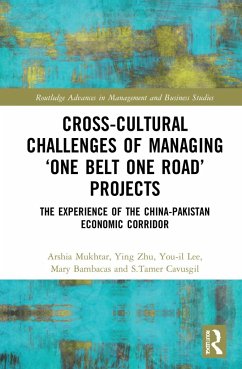The China Pakistan Economic Corridor (CPEC) is a flagship program of China's 'One Belt One Road' initiative, created to boost economic cooperation between China and Pakistan with significant political and economic implications in the region. This book looks at critical issues when developing capabilities of cross-cultural management, adaptation and adjustment through cross-cultural understanding and network building from the CPEC case study.
The book highlights the importance of acculturation experience, cross-cultural networking, networking behaviour (guanxi vs. hawala), and factors influencing cross-cultural adjustment, which would enhance the overall performance of 'One Belt One Road' projects in general. It looks at how the Chinese and Pakistani employees' national cultures affect their behaviour while working on the CPEC projects. The book offers insights into what cross-cultural adjustments are effective in creating improved individual and organizational performance.
In an increasingly globalized world in which the practice of working with people from multiple cultural background is more of a norm, this book will be a useful reference for those who are interested to achieve success in multi-cultural settings.
The book highlights the importance of acculturation experience, cross-cultural networking, networking behaviour (guanxi vs. hawala), and factors influencing cross-cultural adjustment, which would enhance the overall performance of 'One Belt One Road' projects in general. It looks at how the Chinese and Pakistani employees' national cultures affect their behaviour while working on the CPEC projects. The book offers insights into what cross-cultural adjustments are effective in creating improved individual and organizational performance.
In an increasingly globalized world in which the practice of working with people from multiple cultural background is more of a norm, this book will be a useful reference for those who are interested to achieve success in multi-cultural settings.
"This book should be of particular interest to scholars of cross-cultural management as it contrasts the networking behaviour of employees from two different Asian cultures -- China and Pakistan. The context is the working environment of China Pakistan Economic Corridor projects. Examining the networking behavior of host and home country employees, the authors provide valuable insights on the cultural factors which either facilitate or hinder productivity in these collaborative projects." - Professor Pervez N. Ghauri, University of Birmingham, U.K.
"China's Belt and Road Initiative is now a well-known topic. This book makes a unique contribution to the growing to the literature as it discusses China's investment projects in the specific instance of Pakistan. The so-called China Pakistan Economic Corridor represents numerous projects between the two countries. Based on extensive interviews with managers from both nations, this book addresses the role of social networks. The book should be of great interest to those studying employee adjustment and achievement in binational environments. Through the book, the reader develops an appreciation of the role of cultural, and contextual and individual factors in cross-cultural collaborative projects." - Professor Leigh Anne Liu, Georgia State University, USA
"A rare find is how I describe this book. This book provides insightful narratives of how two different cultures and their networking phenomena influence cross-cultural cooperation in China's Belt and Road Initiative (BRI). The book shows how important for leaders from different nations to navigate and adapt their masterplan to achieve desired goals." - Professor Teck Yong Eng, Henley Business School, Malaysia
"Despite the universalism of globalization and even some predictions of Pax Sinica, cross-cultural variations retain their salience for businesses around the world. The need for both the recognition and management of such differences is paramount to success and a key skill for effective leaders globally. Therefore, the authors are to be congratulated for providing us with well contemporary, well articulated and analysed examples of this important area. This book deserves a prominent place on the shelves of not only libraries but the offices of international business managers." - Professor Chris Rowley, Kellogg College, University of Oxford, UK
"China's Belt and Road Initiative is now a well-known topic. This book makes a unique contribution to the growing to the literature as it discusses China's investment projects in the specific instance of Pakistan. The so-called China Pakistan Economic Corridor represents numerous projects between the two countries. Based on extensive interviews with managers from both nations, this book addresses the role of social networks. The book should be of great interest to those studying employee adjustment and achievement in binational environments. Through the book, the reader develops an appreciation of the role of cultural, and contextual and individual factors in cross-cultural collaborative projects." - Professor Leigh Anne Liu, Georgia State University, USA
"A rare find is how I describe this book. This book provides insightful narratives of how two different cultures and their networking phenomena influence cross-cultural cooperation in China's Belt and Road Initiative (BRI). The book shows how important for leaders from different nations to navigate and adapt their masterplan to achieve desired goals." - Professor Teck Yong Eng, Henley Business School, Malaysia
"Despite the universalism of globalization and even some predictions of Pax Sinica, cross-cultural variations retain their salience for businesses around the world. The need for both the recognition and management of such differences is paramount to success and a key skill for effective leaders globally. Therefore, the authors are to be congratulated for providing us with well contemporary, well articulated and analysed examples of this important area. This book deserves a prominent place on the shelves of not only libraries but the offices of international business managers." - Professor Chris Rowley, Kellogg College, University of Oxford, UK








